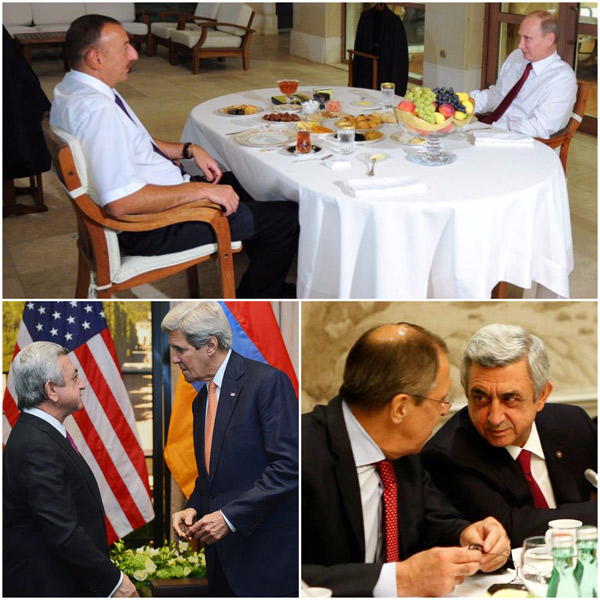Karabakh problem cannot be resolved peacefully as long as one of the OSCE Minsk Group Co-Chair countries incites Aliyev to war
On May 16, in Vienna, the meeting of senior officials of the OSCE Minsk Group co-chair countries with Serzh Sargsyan and Ilham Aliyev is a hope that it will be possible to ensure a continuity to the negotiation process. The negotiation process has appeared in an impasse due to the consistent efforts of Baku in the last few years. The joint statement of US Secretary of State, John Kerry, Russian Foreign Minister Sergey Lavrov and Secretary of State for European Affairs of France Harlem Désir issued as a result of the Vienna meeting is a ground for the peaceful settlement through negotiations. Baku efforts to overthrow the OSCE Minsk Group format vanished with the Vienna meeting.
There is no alternative to the OSCE Minsk Group, and this was once again unanimously declared by the international community. Next, the Vienna meeting made Aliyev understand that it is not only impossible to escape from the commitments of the 1994 ceasefire and 1995 documents, but it is also impossible to cancel them to which Baku is striving officially. But this also means a registration of the involvement of Nagorno-Karabakh as a party in the negotiations. Another question is how the official Yerevan will use the provided opportunity after the April war and what practical steps will be taken for the return of Karabakh to the negotiation table. The other important affirmation of the Vienna meeting was the US proposal a few months ago regarding the use of investigation mechanisms for the border incidents, which so to speak was turned into a document. Aliyev actually gave his consent to it.
These results definitely derive from the interests of the Armenian side. But is there a guarantee that Aliyev will fulfill his assumed commitments? No. Is there a guarantee that Aliyev will not apply for a new adventure and a new aggression? No. Is there a guarantee that Aliyev will not break his statements made in Vienna saying that he is in favor of a peaceful settlement of the conflict? No. In the case of Aliyev and his regime, generally no one can give any guarantee. This seems to be clear for everyone. Moreover, Baku has already officially taken the course of giving up the agreements in Vienna.
Read also
Deputy Head of the Presidential Administration of Azerbaijan, also Head of Foreign Relations Department, Novruz Mammadov, commenting on the results of the meeting in Vienna, a day after the meeting said, “During the meeting in Vienna, we agreed to strengthen the ceasefire regime for the continuation of future negotiations. The most important thing is to continue to observe the ceasefire, that there are no provocations, and that in June we begin the process of negotiations.” But commenting on the statement by the Co-Chairs about the expansion of powers of the Personal Representative of the OSCE Chairperson in Office, Novruz Mammadov said, “There can be no significant changes in the mandate of Andrzej Kasprzyk. The statement is the position of the Minsk Group, we assumed no obligations in that respect.”
To say that Baku’s posture was unexpected would be an exaggeration. Baku is always in its “cup”, therefore, both the Armenian side and the international community should try to
understand why Baku allows itself to behaves like that. Why does Baku give up the agreements through negotiations? The answer is clear: it is more beneficial for Aliyev to remind about the Nagorno-Karabakh conflict and the “occupied territories” with aggression rather than to hold a discussion about concessions in the negotiations and fulfill what he promised. And why does Aliyev prefer the way of military solutions? The answer is also simple: because Armenia’s strategic ally is arming Azerbaijan and it feels free to do so. Consequently, who gives the “go-ahead” to Aliyev so that the process does not advance thru the meetings and possible negotiations? The question must be raised and answered. This question will remain unanswered as long as the other important question is waiting for its answer: whose “okay” did Aliyev get, or with whose silent consent he unleashed the war in April after returning from Washington. A few days ago, Azerbaijani websites reported that Russian President Vladimir Putin’s visit to Baku is scheduled, now they report that Putin will visit Azerbaijan and Armenia until the end of May, the aim of his visit is to discuss the Karabakh settlement. Still from the tenure of Medvedev, Moscow was the “sponsor” of the Karabakh settlement for a long time, although the talks under the auspices of Russia did not yield results too.
Now, Washington has assumed an active role in the Karabakh settlement process. Russia under the OSCE Minsk Group co-chair does not raise any objections, however, it is clear that if Russia does not like something, it will not be seen during the tripartite meetings of the Minsk Group, in front of the cameras or the text of joint statements. Russia will continue arming Azerbaijan, and the secretary of the Russian Embassy to Armenia will tell us, “As long as Armenia has not recognized Artsakh, no Russian weapon can go to Artsakh.” The Karabakh issue cannot be resolved peacefully as long as one of the OSCE Minsk Group co-chairing countries incites Aliyev to war.
EMMA GABRIELYAN “Aravot” daily





















































